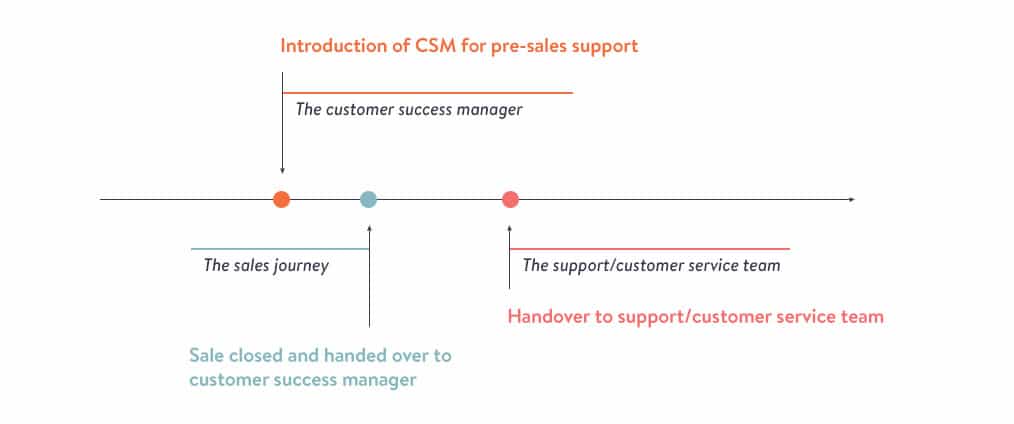A lot has been written about the sales journey and the role a good support team has in keeping customers happy. But there’s one part we don’t hear as much about, and that’s the vital role played by a customer success manager.
But first, let’s get the definitions out of the way.
What Is Customer Success?
Customer success ensures that your customers understand, internalize, and experience the value of your product or service throughout the duration of their journey with your company. Customer success teams strive to improve the customer experience with the goal of retaining customers, reducing churn, and increasing customer loyalty.
What Is a Customer Success Manager?
Customer success management ensures that your customers understand, internalize, and experience the value of your product or service throughout the duration of their journey with your company.
So where does the customer success manager come into play?
The customer success manager – also sometimes known as a client success manager – starts work with your clients once you’re getting close to agreeing a deal. They make sure that the client understands the product they’re buying and have everything they need to start making use of it. The role bridges the gap between sales and support.
The customer services manager is not there primarily to sell, or to provide tech support. They are there to make sure that the customer feels happy about their purchase – before they buy it, just after they buy it, and for the lifetime of the product.
The role is only a decade old, but has a 34 per cent annual growth rate. This is down to the growing number of companies using subscription and consumption-based services, such as SaaS and cloud.
These “recurring-revenue” models place much greater emphasis on customer satisfaction, continued purchase, and a low churn rate. The customer success manager is key to making that happen.
Below is a typical sale to post-purchase path with the key roles played by a customer success manager:
The prospect-to-customer journey starts with a sales individual and ends with the customer support or service team. During this journey, the customer success manager acts as an enabler, moving the customer along the sales journey and handing them off from sales to support.
In this post, I’ll show you what a customer success manager does, how they fit into the prospect-customer sales journey, and why they’re so indispensable.
The Customer Success Manager at Pre-sale Stage
The customer success manager’s real role at the pre-sales stage is to demonstrate value to the customer and also help sales demonstrate a proof of concept.
A customer success manager is not another support agent. It is not the customer success manager’s primary job role to answer technical queries or help customers configure their software, but it is their job to help them see what their software can do.
Excellent customer success managers are also instrumental in helping the sales team close deals that have complex or not easily demonstrable requirements. Smart sales individuals use the services of a customer success manager as a bargaining chip or value-added service while closing sales.
A customer success manager also helps build a positive image of an organization’s support during the pre-sales stage. By acting as a single point of contact for the prospect, the customer success manager is largely responsible for the prospect’s initial impression of the level of support that can be expected from an organization.
In the ideal world, every opportunity should have a customer success manager assigned. However, this is not always feasible.
So the first things any organization should decide on are the criteria to determine when a customer success manager will be introduced to a prospect. These should be product– and organization-specific, but some criteria may include:
- A prospect with complex technical requirements
- A high-value prospect
- A prospect that is starting small but will eventually add a lot of licenses
Customer Success Managers ALWAYS Support Onboarding
The customer success manager is involved in setting up new accounts and onboarding customers after the purchase is made.
Since the customer success manager already has a good understanding of the customer’s business needs from the pre-sales stage, they work with the customer to make sure they can extract the most value from the product after purchase.
During the onboarding process, the customer success manager talks past feature implementation and helps implement a solution to the customer’s problems.
For example, instead of helping a customer configure a certain feature, the customer success manager first understands why the customer needs a feature and then offers the best way to achieve what the customer wants.
The actual purpose of onboarding a customer is to make sure they get the most out of the solution, making it an integral part of their organization’s day-to-day working. In effect, a customer success manager helps increase the ‘stickiness’ of the solution within an organization. This eventually helps prevent customer churn. In fact, most organizations use churn as a metric to measure a customer success manager’s performance.
The Customer Success Manager Post Onboarding
Once the customer is on board, he/she is introduced to the support team. If the customer success manager has been nudging the customer towards the support team during the onboarding, then the move should be seamless.
However, an abrupt handover might make it seem like the customer success manager has lost interest in the customer and has more important tasks to do. A customer success manager should stay in contact with customers after handing over to support.
An easy way for customer success managers to stay in touch with customers is by automating an email campaign that discusses best practices and upcoming events, sent in the customer success manager’s name. This will allow your customer success managers to help new customers but at the same time keep in touch with existing customers and keep the lines of communication open.
What are the Responsibilities of a Customer Success Manager?
The customer success manager role is viewed differently in different organizations. The role is finely balanced between different priorities. There are those who argue that the customer success manager is a part of the sales team and should therefore be responsible for selling the product they work on.
Others argue that the customer success manager is much more of a consultant to the customer, and should if anything take the customer’s side when advocating for how the software product is developed in the future.
Here are some of the core responsibilities.
1. Understand the customer’s needs to help them exploit your software
Your customer success manager needs to demonstrate the software efficiently and in a way that best caters to your prospects’ needs. If they do not, the chances of the prospect becoming a lost lead increase greatly.
The customer success manager shouldn’t look to tick off all product capabilities on a list, but address the customer’s direct needs and showcase that part of the product. Rushing a prospect through a quick demo can come across as insincere or as if your CSM doesn’t care. It’s much wiser for your CSM to introduce the prospect to a support team member who can walk them through it.
2. Understanding customer value
This one may sound simple, but knowing the value of a prospect is vital, especially immediately after the purchase stage. Sometimes you may think you don’t have a big customer, but if this is a SaaS or Tech company that’s just received funding, you know they’re going to be a big customer for the business.
Investing extra product mentoring is ideal to make sure the customer successfully onboard. Also for a big customer or big potential customer, you’ll want to ensure your customer success manager has informed the support team lead. That way support teams can work proactively to help reduce churn.
3. Customization
Here the customer success manager should liaise with an account manager in the support team. Good account management helps the customer roll out the software at their company.
This process helps the customer shape the software to be compatible with their requirements. It also shares knowledge and helps the customer develop their business – a healthy step towards building a long-lasting relationship.
4. Renewals
You do not want your customer success manager to be too pushy a salesperson. They should be viewed as on the client’s side. But they should be aware of when renewals are due, make sure that the customer is happy with everything when leading into the renewal, and make sure that everyone is in place to negotiate a successful renewal. It’s not about them selling, it’s about your sales team successfully leveraging the relationship.
5. Upsells and referrals
Exactly the same is true for upsells and expansions. Customer success management is not about hunting down revenue. It’s not about actively targeting opportunities to get the client to put more business your way. But the customer success manager should certainly be aware of when an enhanced subscription might be in both parties’ interests.
6. Referrals and feedback
And the same story all over again. Customer success management is there to make sure that customers have a successful time with your product. And customers who succeed with your product will provide referrals to other companies.
7. Client advocacy
As someone with a foot in both camps, the customer success manager is in a position to help you understand what the client needs. They should be consulted when your company is considering new developments and changes for a product, and should feel empowered to help people in all departments understand what it is that their clients actually need. In short, they can act as the voice of the customer within your company.
What Does It Take To Be a Good Customer Success Manager?
When it comes to hiring a customer success manager for this role you’ll need:
- A customer success manager with good emotional intelligence. This will help them easily empathize and understand the customer’s requirements.
- A good understanding of project management is important. The customer success manager will be working with two teams. It’s essential they know how to give the right amount of information and assign specific tasks to individual teams or members with clear outcomes needed.
- Proactive and willing to improve on processes. That means creating a feedback loop to the sales team to teach moments that make customers go “wow, that’s exactly what I need” for product demonstrations.
- And before you even hire, use a take-home skills test to see how they would handle a potential scenario. It’s best to use an actual conversation that happens in your prospective journeys often.
Leaning on these four details will help you find customer success manager candidates who are qualified for your team. However, don’t shy away from thinking out the box. You know your organization and culture better than anyone else, so make a hiring decision with that in mind.
Customer Success Manager Interview Questions
In the section above, you learned more about getting the right person on your team. But before you can do that, you need to drill down during the interview process. Here are some of the best interview questions you can ask:
- Can you explain your view of what our product or service does?
- What approach do you take to problem-solving?
- How do you pinpoint up-sell opportunities?
- How does your past experience and skill set transfer to this position?
- Do you have experience collaborating with sales professionals in your current role?
Again, these questions are just a starting point. You should ask questions based on the specifics of the role, your company, and what you’re looking to accomplish.
Use Customer Success to Create Lifelong Customers
To conclude, the role of a customer success manager is vital for organizations that offer subscription-based products.
Not only does a customer success manager help reduce customer churn, but they are also responsible for enabling customers to make the most of the product on offer.
The role of a customer success manager reaches farther than often thought, and should be involved before a prospect becomes a customer and continues on even after the sale is closed.
Does your organization have customer success managers? How do they fit into the sales journey?








